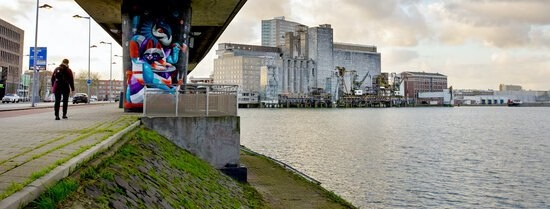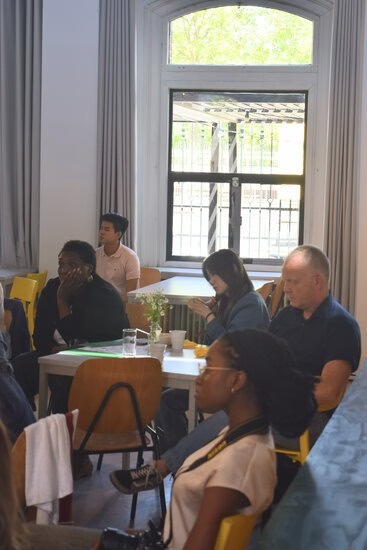What happens when organizations and researchers working on diversity and inclusion in Rotterdam come together? What kind of collaborations would both parties find meaningful and productive? These questions drive Vital Cities and Citizens’ networking tours with diversity and inclusion civil actors in Rotterdam. The second edition took place on June 3. Participants from multiple civic organizations and four different EUR faculties travelled from Rotterdam South to Rotterdam North to learn from each other and discuss possible collaborations.
Afrikaanderwijk cooperative: Properly recognizing and involving residents
The tour started at Gemaal op Zuid, a former pumping station which now hosts the Afrikaanderwijk cooperative. Annet van Otterloo explained that the cooperative started out as an art project focused on imagining possibilities for “development without displacement.” For some of their activities, they paired artists with market vendors and turned the market into an agora: a public place where the community could come together. A police ban on assembly on the market motivated the cooperative to create their own working spaces, including Gemaal op Zuid. A communal kitchen and a neighbourhood atelier were born, and they used ‘Right 2 Challenge’ to take over the cleaning of the market. In van Otterloo's view, useful collaborations involve and recognize local residents in the long term. Residents should "sit like equals at the table."
Right to the City: The role of students
Mustapha Eaisaouiyen, from the Right to the City initiative, introduced us to the Manifesto they put together to promote a better plan for the municipality’s ‘housing vision.’ Every Rotterdammer has the right to affordable housing in a social, pleasant and safe environment, regardless of income, background or length of stay, he explained. Eaisaouiyen imagines valuable collaborations with the university: students could be involved, like they were in the 70s and 90s, sharing knowledge and helping out with participation processes and, for example energy solutions. He would also welcome opportunities to facilitate exchange among right to the city initiatives in various countries.
RADAR: Assessing impact
Anti-discrimination organization RADAR operates in Rotterdam and other Dutch cities. Lisette Tanis and Inte van der Tuin explained that while the organization’s mission is directly derived from article 1 of the Dutch Constitution, they also pay attention to issues of class, which are less visible in the law. Their main task is to be a contact person for people to denounce cases of discrimination. They also monitor the cases and offer trainings. For them, a key challenge is to further improve or add new tools to how they measure the impact of their work.
Second stop: The Heilige Geesthuis
Tour participants crossed the Erasmus bridge and the city center by bike and tram to arrive at the old Heilige Geesthuis, where emancipation organization Dona Doria is based. In this historical building that dates back to the 1800s, they met representatives from Space010, Dona Daria's youth department, and RoSA, Rotterdam Social Alliance.
Space010: Youth’s storytelling to inspire research and teaching
Space010 aims at creating “space and ideas for and from youth*” and follows an intersectional approach. Director Gert-Jan Verboom illustrated this by describing several of their programs. Unboxing Rotterdam, for example, is a forum for queers and youths of colour to connect by sharing personal stories. The Space Academy, in turn, offers training for engaging in inclusive 'space-making' in the city. In terms of meaningful collaboration, Verboom explained, Space 010 would be interested in (tools for) evidence-based impact assessment of their projects and interventions, as well as in exploring how young people’s personal stories can inspire research and knowledge production.
RoSA!: Alliances to fight widening inequalities
RoSA!’s complete board joined the session. Hans Goosen, Therese Steur, Adriana Rollingswier, and Tjeerd de Boer placed the organization’s 15-year fight against poverty in Rotterdam within broader socio-political transformations. Rollingswier specifically referred to her experience as a social worker at a time when the Dutch welfare model was replaced by the so-called participation society. Trust was replaced by mistrust, she said. She thus “turned to RoSA!” to turn her “anger into action”. Likewise, de Boer underscored the close relation between the country’s neoliberal policies and its social inequalities. Widening inequalities in Rotterdam, Goosen explained, keep RoSA! busy and eager to build new collaborations to continue challenging unfair policies, proposing new ones, and providing direct assistance to people in need.
Contrasting and appreciating approaches
Altogether, the day’s presentations and formal and informal conversations underscored the diverse and rich ways in which civil actors fight inequalities and interact with citizens in Rotterdam. It was particularly interesting, for example, to hear how representatives of Space010 and RoSA! contrasted and appreciated each other’s approaches: one focused on youth and intersectionality and the other defending welfare principles and paying special attention to class-based discussions. The participation of EUR researchers and students from different disciplines, as well as André Hendrikse, from Impact at the Core; Wim van Heemst, chair of Me & Society; and Michelle van Zanten, from 010 inclusief, made the discussion even richer.
Overall, the day opened valuable possibilities for collaboration between and within the EUR community and local organizations working on diversity and inclusion. It confirmed that bringing together academics and civic actors who share a common interest in Rotterdam’s diversity and inclusion, and doing so in diverse venues across the city, is not only fun. It can also be productive in terms of opportunities to learn from each other and eventually work together.
Interested in knowing more about VCC networking tours?
The tours offer EUR staff and students from different faculties the opportunity to meet representatives of diversity & inclusion civil actors in Rotterdam and discuss possibilities for collaboration. Routes and hosting organizations cover (parts of) VCC's own alternative city map. During the first edition of the tour, in December 2021, EUR staff met with representatives from GayRotterdam.nl, DIG IT UP, Dona Daria, Me & Society, Verhalenhuis Belvédère. A third edition of the event will take place towards the end of 2022. Keep an eye on VCC’s newsletter to register and join!
* For the translation, this is “ruimte en ideeën voor en van jongeren” (https://www.donadaria.nl/space-jongerenafdeling-dona-daria/)
Networking event June 2022

- Associate professor
- Assistant professor




